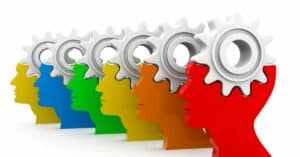You can’t choose all your co-workers (unless you’re in HR). But as you might be seeing them more often than your own family, it’s important – if not essential – that you find a way to get along with them. This is where your social skills come in.
Let’s take a look at what social skills are, how they’re related to emotional intelligence and how you can improve them to benefit yourself and your workplace.
What are social skills?
Social skills are your ability to understand and manage other people’s emotions. Sounds a bit manipulative, doesn’t it? Don’t worry, it’s not like that – it’s meant more in the way of spreading positive feelings to foster better relationships. For example, when you smile other people are likely to smile back.
Social skills include:
- Persuasion and influencing: Being able to read the emotional atmosphere and adjust how they behave to appeal to others.
- Communication: Actively listening to others and being able to articulate your thoughts and emotions.
- Conflict management: Helping others share emotions to have healthy discussions and find logical win-win solutions.
- Leadership qualities: Having the ability to clearly express a plan and encourage others to be enthusiastic about it, while providing support and guidance.
- Change management: Being able to make change sounds positive and removing barriers.
- Strong relationships: Being interested in people, wanting to get to know them and being good at managing a wide variety of connections.
- Collaboration and cooperation: Sharing ideas and working with others to foster commitment and build a better environment for everyone.
How are social skills related to Emotional Intelligence (EI)?
To work well with others, you’ll first need to understand your own emotions (self-awareness). Next you need to learn to manage them and use them to motivate you (self-regulation).
Once you can do this, you’ll be able to better relate to other people’s feelings (empathy) and influence them (social skills).
How can good social skills benefit you and your workplace?
Here are a few benefits of good social skills and EI:
#1. Better working environment
if you and your team are able to communicate and work well together, then this will create a more positive culture and stronger support system. You might even see a boost in productivity too, as it’s easier to work in a pleasant environment.
#2. Improved leadership skills
If you’re good at communicating, working with others, picking up on other people’s emotions and motivating people, you’ll be more suited to leadership as these are some key skills.
Good social skills will help leaders understand how to give useful feedback, how to be more supportive and put across ideas more effectively. This can give your team a big morale boost as if you can show them you’re a good leader, they’ll be more likely to trust you and want to work hard.
#3. More cohesive team
Having good social skills enables you to make deeper connections with people from different backgrounds and cultures.
Being able to pick up on non-verbal cues, understand other people’s emotions and empathise with them means misunderstandings and conflict will likely be reduced. So your team will be able to work together more smoothly.
How can you improve your social skills?
The first thing you can do to improve your social skills is figure out which areas you need to practise.
To find out, you can ask friends and trusted co-workers for constructive feedback. This has the added benefit of showing you care about how you act and how you’re perceived.
If you don’t feel comfortable asking for feedback (that hesitancy may indicate one area of your social skills to improve), then you can work it out yourself by observing which other social interactions make you feel uncomfortable.
The best way to improve your social skills is to put them into practice – you might want to try first with friends or family to take away the pressures of being in the workplace.
Here are a few practical ways to improve your social skills:
#1. Give compliments, express gratitude and apologise when necessary
Paying a colleague a compliment or expressing your gratitude is a simple way to start a genuine conversation and it can make them feel more relaxed, as well as make the environment more positive. It’s best to give compliments about things that are within someone’s control, like an accomplishment or their presentation style. This is because it shows you value them as a person and a hard working employee. Similarly, showing your appreciation can really help a team member feel accomplished and more motivated.
It’s also important to acknowledge when you’re wrong or have made a mistake, so always give a genuine apology when it’s warranted. This is another good way to show you care, value their feelings and are paying attention to how your behaviour impacts other people.
#2. Ask more questions
Show your interest in your team by asking them open-ended questions to build your relationship and get to know them. Ask them about their weekend, hobbies, likes, dislikes, but steer clear of divisive or inappropriate topics like politics, religion or sexuality.
Chatting with your co-workers allows you to practise your active listening and empathy skills. Show that you’re engaged in the conversation by asking follow-up questions and showing interest in things that interest them. It’s also important to reciprocate information – asking endless questions can feel a bit like an interview, so don’t forget to offer up information about yourself to help form a meaningful and lasting connection.
#3. Avoid manipulative or passive-aggressive behaviour
It’s normal to disagree and you shouldn’t expect every day to be smooth sailing. But if you do need to express an opinion, be respectful and be willing to discuss it. Being passive-aggressive can also make people feel uncomfortable and could alienate your team.
There’s a fine line between discussing your point and manipulating others to go along with what you want, so be careful to always be mindful that not everyone will see things the same way and that’s okay.
#4. Find resources
There are plenty of articles, books, videos and other resources to help you improve a variety of social skills, like communication, charisma and expressing gratitude.
Here are a few you might find useful:
- An Adult’s Guide to Social Skills, for Those Who Were Never Taught by The New York Times
- Social Skills: What They Are and 9 Ways To Develop Them by Indeed.com
- There’s Nothing Small About “Small Talk” worksheet by Dr. Susan J. Bily Lindner
- Managing Disagreements worksheet by Dr. Susan J. Bily Lindner
- A Mentalist Guide to Social Interaction TED Talk by Tom Indigo
- An introvert’s guide to social freedom TED Talk by Kaspars Breidaks
- What Being Autistic Taught Me About Being Human TED Talk by Daniel Wendler







